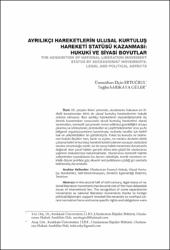| dc.contributor.author | Ertuğrul, Ümmühan Elçin | |
| dc.contributor.author | Güler, Tuğba Sarıkaya | |
| dc.date.accessioned | 2021-01-14T18:22:27Z | |
| dc.date.available | 2021-01-14T18:22:27Z | |
| dc.date.issued | 2017 | |
| dc.identifier.issn | 1304-2408 | |
| dc.identifier.uri | https://app.trdizin.gov.tr/makale/TWpRNE56WTVPUT09 | |
| dc.identifier.uri | https://hdl.handle.net/20.500.12587/14208 | |
| dc.description.abstract | XX. yüzyılın ikinci yarısında, uluslararası hukukun en ihtilaflı konularından birisi de ulusal kurtuluş hareketlerinin hukuki statüsü olmuştur. Bazı ayrılıkçı hareketlerin siyasal/diplomatik dış destek kazanmaları sonucunda ulusal kurtuluş hareketleri olarak tanınmaları, normatif çerçevenin revize edilmesi gerekliliğini ortaya çıkarmış ve sözleşmeler, protokoller ve çeşitli hükümetler arası ya da bölgesel organizasyonların kararlarıyla, muharip taraflar için belirli hak ve yükümlülükler ön görülmüştür. Fakat bu konuda ne belirlenen hukuki ölçütler tam, kesin ve açıktır, ne merkez devletin silahlı çatışma halini ve kurtuluş hareketi katılımcılarının savaşan statüsünü tanıma zorunluluğu vardır, ne de savaş halinin tanınması durumunda doğacak olan yasal hakları garanti altına alan güçlü bir uluslararası yaptırım mekanizması bulunmaktadır. Uluslararası normatif rejimin zafiyetinden kaynaklanan bu durum sebebiyle, teorik normların etkinlik düzeyi pratikte güç eksenli reel politikanın çizdiği gri sınırlarla belirlenmiş durumdadır. | en_US |
| dc.description.abstract | In the second half of 20th century, legal status of national liberation movements has become one of the most debatable issues of international law. The recognition of some separationist movements as national liberation movements thanks to foreign political/diplomatic support revealed the necessity to overhaul current normative frame and some specific rights and obligations were prescribed for belligerent parties through conventions, protocols and resolutions of various intergovernmental or regional organisations. However, neither legal criteria on this subject is complete, accurate and clear; nor centre state has to recognise the condition of armed conflict and combatant status of national liberation movements' participants; and also there is no strong international enforcement mechanism which guarantees legal rights originated in case of the recognition of a war. Due to the condition that stems from the vulnerability of international normative regime, the effectiveness of theoretical norms is specified according to grey boundaries of power-centred Reel Politics in practice. | en_US |
| dc.language.iso | tur | en_US |
| dc.rights | info:eu-repo/semantics/openAccess | en_US |
| dc.subject | Hukuk | en_US |
| dc.title | AYRILIKÇI HAREKETLERİN ULUSAL KURTULUŞ HAREKETİ STATÜSÜ KAZANMASI: HUKUKİ VE SİYASİ BOYUTLAR | en_US |
| dc.title.alternative | THE ACQUISITION OF NATIONAL LIBERATION MOVEMENT STATUS BY SECESSIONIST MOVEMENTS: LEGAL AND POLITICAL ASPECTS | en_US |
| dc.type | article | en_US |
| dc.identifier.volume | 0 | en_US |
| dc.identifier.issue | 129 | en_US |
| dc.identifier.startpage | 321 | en_US |
| dc.identifier.endpage | 346 | en_US |
| dc.relation.journal | Türkiye Barolar Birliği Dergisi | en_US |
| dc.relation.publicationcategory | Makale - Ulusal Hakemli Dergi - Kurum Öğretim Elemanı | en_US |
















